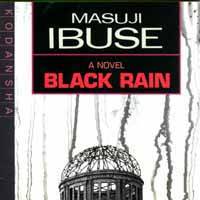Masuji Ibuse's classic 1965 novel "Black Rain" takes readers into the everyday lives of a family poisoned by radiation sickness. The narrative structure carefully balances between the present time of the novel and journal entries from the bombings of Hiroshima to craft a carefully wrought masterpiece of how great tragedy begets an unending spool of unraveling quieter tragedy.
Black Rain, by Masuji Ibuse Translated by John Bester.
Kodansha USA, Fiction.
Four years after World War II, Yasuko finally has a chance at a normal life — marriage to a young man from a good family. Her earlier marriage prospects were consistently defeated by a rumor that she suffers from radiation sickness, despite a clean bill of health. And when her newest suitor requests proof of her whereabouts during the bombing, another spoiled marriage agreement seems imminent.
Yasuko's uncle, Shigematsu Shizuma, asks his wife to copy out Yasuko's journal as proof that she was not exposed, and Ibuse uses this plot device to weave Yasuko's journal entries, and later those of her uncle's, into his narrative. The result: painstaking, detailed recordings of the bombing and its aftermath.
Based on interviews and notes from actual survivors, the novel has been called "cold" or "clinical" by some critics, but the documentary style allows Ibuse to reveal Japanese customs and culture in an affirmation of normalcy in abnormal situations.
"Black Rain" journeys into the heart of superstition and fear — places the survivors of Fukushima know all too well, and a place Japan bibliophiles owe it to themselves to visit.
Read archived reviews of Japanese classics at jtimes.jp/essential.



















With your current subscription plan you can comment on stories. However, before writing your first comment, please create a display name in the Profile section of your subscriber account page.